 |
Socio-Political Issues
Hillaire Belloc, the Liberal - Part II
‘As a Catholic, I Am Strongly
Attached to Rousseau’
Patrick Odou
The second chapter of Hillaire Belloc’s The French Revolution (1) is simply titled Rousseau. In it Jean-Jacques Rousseau and his book The Social Contract (2) are praised extensively for expressing the political theory of the French Revolution. For example:
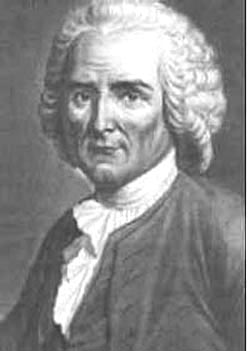
Rousseau and his Social Contract were greatly admired by Belloc
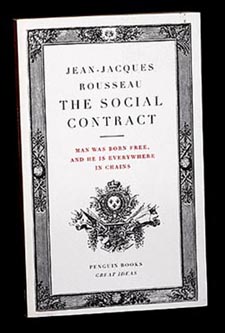 |
“The text of the [French] Revolution was his Social Contract. Now it is not too much to say that never in the history of political theory has a political theory been put forward so lucidly, so convincingly, so tersely or so accurately as in this short and wonderful book” (p. 33).
Belloc eulogizes the “political morality” expressed in Rousseau’s work, and considers this book to be “the formula of the Revolutionary Creed”:
“Such is the general theory of the Revolution to which the command of Jean-Jacques Rousseau over the French tongue gave imperishable expression in that book whose style and logical connection may be compared to some exact and strong piece of engineering. He entitled it The Social Contract, and it became the formula of the Revolutionary Creed. But though no man, perhaps, has put the prime truth of political morals so well, that truth was as old as the world” (p. 20).
He also praises Rousseau’s grasp of religious matters in relation to the social order. Indeed, he states:
“If proof were needed of what particular merits this pamphlet displayed, it would be sufficient to point out that in a time when the problem represented by religion was least comprehended, when the practice of religion was at its lowest, and when the meaning, almost, of religion had left men’s minds, Rousseau was capable of writing his final chapter” [the most expressly anti-Catholic chapter] (p. 36).
Yet Belloc honors Rousseau as “the chief prophet of the Revolution…” (p. 28), and admits that, “Rousseau’s hundred pages [The Social Contract] are the direct source of the theory of the Modern State” (p. 38).
It is not difficult for anyone who reads The French Revolution or even only these quoted eulogies by Belloc to see that he is an enthusiast of Rousseau.
In my previous article I transcribed several strong condemnations of the French Revolution made by Popes. Those texts also mentioned - directly or indirectly - the “philosophers” of the French Revolution, among whom Rousseau stands out. Therefore, based only on those condemnations one could say that it is quite unacceptable that Belloc, who pretends to be an authentic Catholic historian, has such a distorted admiration for one of the Church’s adversaries.
But here I plan to go a step further. I will show how Rousseau is explicitly and meticulously anti-Catholic in that very book praised by Belloc.
The anti-Catholic character of The Social Contract
In this article I won’t discuss how, theoretically speaking, The Social Contract conflicts with Catholic doctrine. TIA recently posted an article by Prof. Plinio Corrêa de Oliveira that already envisages some of Rousseau’s flaws in this regard. Here, I limit myself to presenting some quotes from Rousseau’s work that, explicitly and by name, attack either the Catholic Church or her teachings.
In The Social Contract, Rousseau states that the Catholic Religion, with her social reflections ,constitutes the worst kind of religion for man:
“There is a third and more curious kind of religion, which, giving men two legislative orders, two rulers, two homelands, puts them under two contradictory obligations and prevents them being at the same time both churchmen and citizens. Such is the religion of the Lamas, such is that of the Japanese, and such is Catholic Christianity. One might call this the religion of the priest.
“It produces a kind of mixed and anti-social system of law which has no name. From the political point of view … [this kind of religion] is so manifestly bad that the pleasure of demonstrating its badness would be a waste of time. Everything that destroys social unity is worthless; and all institutions that set man at odds with himself are worthless” (Social Contract, p. 160).
Rousseau condemns the dogma extra Ecclesiam nulla salus so rigorously that he teaches that anyone who follows this dogma should be expelled from the State:
“But anyone who dares to say ‘outside the Church there is no salvation’ should be expelled from the State…” (SC, p. 168).
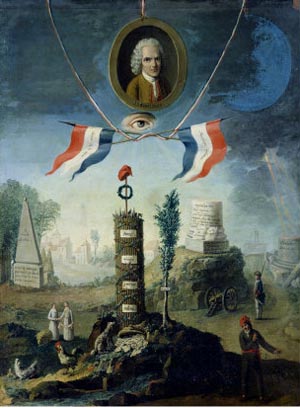
An allegory of the French Revolution showing Rousseau as the prophet of Deism |
It is quite remarkable that one of the main thinkers of the Modern State should defend such a posture, which in practice presupposes nothing less than the establishment of an inquisition to watch and persecute anyone who does not accept the “dogma” that all religions are equal before the State. The intolerance of the tolerance of the Modern State is a clamorous contradiction that eventually deserves to be analyzed in more detail.
Rousseau envisions a religion of mankind that has something of a Masonic pan-religion of Deism and something of the so-called primitive Church of Progressivism. This new religion should replace the Catholic Church as she was at Rousseau’s time:
“There remains the religion of humanity, or Christianity, not the Christianity of today, but that of the Gospel, which is altogether different. Under this holy, sublime and true religion, men, as children of the same God, look on all others as brothers, and the society which unites them is not even dissolved by death” (SC, p. 161).
Rousseau depicts the new religion as an ecumenical religion that would embrace all beliefs and not combat error or vice. This Deism, as it came to be known, worshipping a vague universal being, could not tolerate any other religion that did not strictly adhere to its own principles. Thus, any religion that is “intolerant” of error or evil must be rejected. Indeed, Rousseau defends his position:
“The dogmas of the civil religion must be simple and few in number, expressed precisely and without explanations or commentaries. … The sanctity of the social contract and the law – these are the positive dogmas. As for the negative dogmas, I would limit them to a single one: no intolerance. Intolerance is something which belongs to the religions we have rejected” (SC p. 166).
Rousseau affirms that the Church's social teachings are either utopian or disastrous to society:
“It is said that a people of true Christians would form the most perfect society imaginable [St. Augustine in The City of God]. I see but one great flaw in this hypothesis, namely that a society of true Christians would not be a society of men. I would even say that this imagined society, with all its perfections, would be neither the strongest nor the most durable. Being perfect, it would be without bonds of union; its ruinous defect would lie in its very perfection” (SC, p. 162).
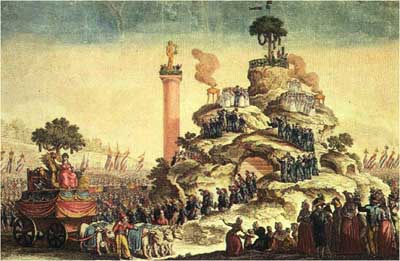
Paris, June 8, 1794: the feast to the Supreme Being. On the column, a vague deity that encompasses all beliefs is adored |
Again, the author of The Social Contract - the “prophet” admired by Belloc - states that Christian law is more harmful than helpful to the State:
“I believe that if the historical facts were analyzed from this point of view, we could easily refute the opposing beliefs of both Bayle and Warburton, the one holding that no religion is useful to the politic body; the other that Christianity is its best support. We could refute the first by showing that no State has ever been founded without religion as its base; and we could refute the second by showing that the Christian law is at bottom more injurious than serviceable to a robust constitution of the State” (SC, p. 159).
After praising Paganism, Rousseau censures Our Lord Jesus Christ for establishing a spiritual kingdom on earth, causing disunity and division in the State.
“In the end, when the Romans had spread their faith and their gods with their Empire, and often themselves adopted those of the vanquished in giving all and sundry the rights of citizenship, the peoples of this vast Empire gradually found themselves with a multitude of gods and faiths, which were everywhere almost the same; and this is how Paganism became one and the same religion throughout the known world.
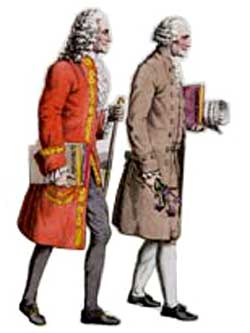
Voltaire and Rousseau, the philosophers of the French Revolution condemned by the Popes |
“It was in these circumstances that Jesus came to establish a spiritual kingdom on earth; this kingdom, by separating the theological system from the political, meant that the State ceased to be a unity, and it caused those intestine divisions which have never ceased to disturb Christian peoples … Since princes and civil laws continued to exist, the consequences of this dual power had been an endless conflict of jurisdiction, which has made any kind of good polity impossible in Christian States, where men have never known whether they ought to obey the civil ruler or the priest” (SC, p. 157).
It appears that Belloc, one of the founders of Distributism, which pretends to be a return to the Medieval economics of the guilds - also agrees with Rousseau that Feudalism is an “iniquitous, absurd and irrational system” that “degrades” humanity and “dishonors” man, and which is “contrary to natural justice and all sound polity” (SC, p. 9). In fact, Rousseau states:
“The idea of representation is a modern one. It comes to us from feudal government, from that iniquitous and absurd system under which the human race is degraded and which dishonors the name of man” (SC, p. 113).
As everyone knows, the guild system was just one of the salutary reflections of Medieval Feudalism, the organic system born under the influence of the Church through which society reached its most harmonic and just expression. Contrary to Rousseau’s diatribes against Feudalism, it was praised by several Popes. The classic eulogy Leo XIII made of it is well-known. These were the words of that Pontiff:
“There was a time when the philosophy of the Gospel governed the States. In that epoch, the influence of Christian wisdom and its divine virtue permeated the laws, institutions, and customs of the peoples, all categories and all relations of civil society. Then the Religion instituted by Jesus Christ, solidly established in the degree of dignity due to it, flourished everywhere, thanks to the favor of Princes and the legitimate protection of Magistrates. Then the Priesthood and the Empire were united in an opportune harmony and by the friendly interchange of good favors. So organized, civil society gave fruits superior to all expectations, and its memory subsists and will subsist, registered as it is in innumerable documents that no artifice of the adversaries can destroy or obscure” (Immortale Dei, n. 28).
Conclusion of Part II
After demonstrating in Part I of this series that Belloc errs when he pretends that the French Revolution is praiseworthy and should be supported by Catholics, now in this Part II, I showed that the man he erected as the prophet of the Modern State and put on a pedestal to be venerated by Catholics, actually is fundamentally anti-Catholic and hostile to Catholic social doctrine and the Redeemer himself. Again, Belloc is wrong.
What this analysis indirectly proves is that Hillaire Belloc is a strong promoter of one of the worst representatives of the Deist ideal of a pan-religion submitted to the State.
Far from being a model for Catholics (a notion that has been erroneously spread in the U.S.), Hillaire Belloc appears to be a fifth column assigned to introduce the poison of the French Revolution and admiration for its Deist founder among well-intentioned Catholics. Up to now, the least we can say is that Belloc is a liberal, not a conservative or a traditionalist, and even less a counter-revolutionary.
1. Hillaire Belloc, The French Revolution (New York: Henry Holt & London: Williams – Norgate, Cambridge, U.S.A: The University Press,. 1911).
2. J.J.Rousseau, The Social Contract, (Penguin Books, 1968).

Posted July 28, 2008

Related Articles of Interest:
 Hillaire Belloc the Liberal - Part I: His Support of the French Revolution Hillaire Belloc the Liberal - Part I: His Support of the French Revolution
 Belloc the Liberal - Part III: He Supports the French Terror Belloc the Liberal - Part III: He Supports the French Terror
 Leadership Established by Generosity & Gratitude, Not a Social Contract Leadership Established by Generosity & Gratitude, Not a Social Contract
 Socialism and Distributism in Catholic Clothing Socialism and Distributism in Catholic Clothing
 Feudalism and the Modern State Feudalism and the Modern State
 The State of Mind that Generated the Revolution The State of Mind that Generated the Revolution
 Liberals, Moderns and Progressivists Liberals, Moderns and Progressivists
 Mormon Enigmas Mormon Enigmas
 Revolution and Counter-Revolution: Historic Overview Revolution and Counter-Revolution: Historic Overview

|
Social-Political | Hot Topics | Home | Books | CDs | Search | Contact Us | Donate

© 2002- Tradition in Action, Inc. All Rights
Reserved
|
 |
|